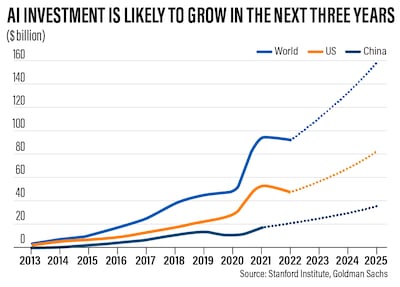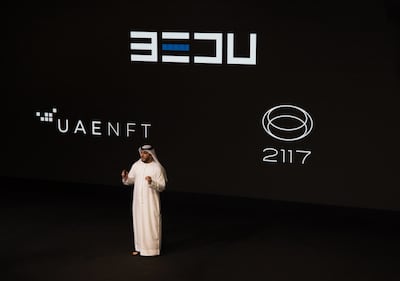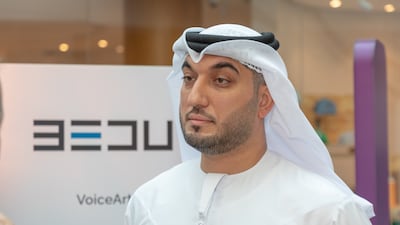Technology has dramatically transformed the world, to state the obvious. As consumers, we feel it in the speed of our everyday tasks.
For Amin Al Zarouni, businesses have to keep up with that speed. But not in terms of adopting the latest innovation to hasten product development – rather, he means go big and fast, right off the bat.
“Any classical and traditional approach on any product cycle starts with an ideation process, then prototyping, designing and implementation,” Mr Al Zarouni, co-founder and chief executive of Dubai-based start-up Bedu, tells The National.
“And once the product is ready to go into a better version, that's when the company starts testing it with consumers. Then it goes live.”
Bedu is focused on artificial intelligence, Web3, the metaverse and blockchain.
“For Bedu, we wanted to follow a completely different approach and change that philosophy. We decided to engage with consumers at a very early stage of that cycle, rather than at the end ... letting them contribute to the creation of that product,” he says.
“That is our understanding of building a product in Web3 or the future internet era.”
Mr Al Zarouni realised the potential of such types of technology in 2021 and thought it was a worthy idea to pursue – not only from a business standpoint but also to help shape the digital future.
At the time, blockchain was already a thing, the metaverse was gaining ground and non-fungible tokens began their polarising existence. Nevertheless, Mr Al Zarouni saw potential – a combined one.
“When those three started to emerge ... [and] people were starting to talk about virtual experiences, we realised that there was a potential marriage between blockchain and AI that could transform how businesses operate or enable their services for their consumers,” he says.
“That was the first moment we realised the creation of value, that vision to really reshape the realisation for emerging technology and enable future services.”
Web3 is the third stage of the World Wide Web's evolution that uses the capabilities of artificial intelligence, machine learning and blockchain to make the internet smarter.
The value of the global Web3 market is projected to hit about $50 billion by 2030, from an estimated $3.34 billion in 2022, growing at a compound annual rate of nearly 47 per cent, the latest data from Cognitive Market Research shows.
It ties in with the metaverse, the virtual space where people interact as avatars, and NFTs, virtual assets that are unique, cannot be replaced with others and can be sent to other digital wallets.
The market size of these sectors is expected to reach $937 billion and $212 billion, respectively, according to Grand View Research.
Bedu wants to ensure that each penny involved will be safe, Mr Al Zarouni says, despite acknowledging the challenges being faced by emerging technology.
These range from data privacy, ethical use and how accessible the technology is.
“They are new to the mainstream. So, adoption is a challenge when it comes to the mainstream, availability when it comes to the main business demand as well,” he says.
“We need to be very ethical when we think of deployment and be very careful when it comes to catching up with the regulations that will shape how our products are being positioned in the market.”
The Bedu team is “laser-focused” on executing its strategies and trying to achieve its ambitions. This will be done by expanding its operations, team and research and development, which will be hastened by a pre-seed round currently taking place.
Mr Al Zarouni says the company aims to raise anywhere between $5 million and $7 million in the funding drive that will run through to the end of 2023.

“We're very realistic in the amount we're raising ... we decided to start our pre-seed round with a mission of accelerating our work in the market when it comes to AI products or merge them,” he says.
“We have defined a specific product that we have been talking about, which is the builder platform that enables more under generative AI, which focuses on forging and provisioning a fully functional application or a digital application through an interaction with AI.”
Mr Al Zarouni is not worried about talk of AI potentially taking over human jobs. While acknowledging that every technology will have an impact, history has shown that each eventually resulted in better outcomes, he says.
“Yes, people adapt, adjust and build new skills so that they can fulfil future jobs that these emerging technologies will create. We have seen many technologies coming in and contributing to the creation of future jobs,” he says.
Bedu is planning to expand its offices so that its products will become more accessible to a wider market, which can scale up geographically and are designed to satisfy the local, regional and, potentially, even the global market.
chief executive of Bedu
All of Bedu's plans are shaping up to be worthy follow-ups to a milestone project it launched more than a year ago – a new virtual world that focuses on the UAE's aspirations of space exploration, and which is the first to simulate the UAE's planned mission to Mars.
The virtual world, called Metaverse Project 2117, aims to become an environment that will host 100 million users in the next 10 years, using blockchain and decentralised hosting techniques to deliver high-quality aesthetics, Bedu said earlier.
Mr Al Zarouni vows to uphold this philosophy. After all, the spirit behind Bedu is in its name – the Bedouin, who have historically inhabited the Arabian peninsula and whom he describes as having “in their blood” the same work ethic the company has.
“We thought this could be a very strong analysis behind the brand identity,” he says.
“We want to play the Bedouin role in emerging technology and start harnessing the benefits of the merger between AI and blockchain and Web3, redefining the future of services.”
Q&A with Amin Al Zarouni, co-founder and chief executive of Bedu

Would things have been different had you started before or during the pandemic?
Time is very crucial whenever you start an adventure, and I am lucky to be one of the people that started the business before Covid-19 – and also after it. The pandemic played a role in hastening digital adoption, across all industries and sectors, and accelerated the emergence of new technology. So, the pace was much faster when managing or beginning a start-up after the pandemic.
The mindset of entrepreneurs when starting a business after the pandemic requires agility and a lot of flexibility to be able to take different curves, because you are being hit by various waves of emerging technology, especially after the pandemic. The cycle is much faster.
How do you differentiate yourself from the competition?
The focus on the product life cycle and the engagement with the consumer base in the early stage. Following this philosophy, which we decided to adapt in the ideation process when creating prototypes, is extremely different from the classical product development cycle.
We focus a lot on user-friendly products to make sure that we build a product that is agnostic. This approach is what differentiates us; the focus on user-friendly apps and agnostic platforms that integrate the existing landscape is another key differentiator.
As an entrepreneur, what have been some of your most interesting moments?
I would say that the different interactions and the continuous feeling that changes all the time. Running a business and finding that responsibility to grow your business from scratch. It is almost like having a newborn baby and trying to basically raise and make sure that they are cared for.
Navigating through different market trends has also been interesting. For example, every time we thought we nailed an idea, as we go through it and brainstorm further, we end up with a completely different idea. That is the nature of business. There are other different moments that I can highlight, either when it comes to interaction with clients or different kinds of competition that we have.
I have been a part of a big enterprise and I can tell that even the quality of meetings when you are start-up gets a different vibe; you need to adapt on how to position yourself and how to present the content that you have. It's a different style of running a business – especially when you are in a growing start-up phase.
What is your advice to budding entrepreneurs?
Being curious, relevant and resilient are extremely important characteristics. The chances of bumping with a business idea and ending up with a completely different idea are very high – and the entrepreneur has to have that flexibility or mind and agility to really to take some very harsh curves to navigate this entrepreneurship journey and also never stop learning.
It is extremely important that we are always keeping our eyes open on what is happening around us. Because the rise of technology is very fast, the user base is also adapting it very quickly, so it is important that we stay relevant.


